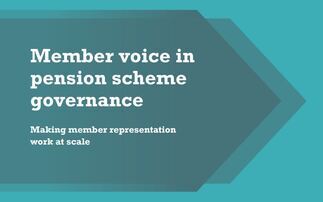
Matthew Blakstad: Fairness is a foundational principle of our pensions system
The latest of Pensions UK’s regular columns looks at the terms of reference for the new Pensions Commission and asks what does fair mean when it comes to pensions.
The world isn't fair. We get that lesson drummed into us from an early age, though evidence from behavioural psychology suggests that we're stubbornly hard-wired to prefer a world where everyone is treated fairly. Since the dawn of democracy, we've founded societies on the principle that everyone deserves a fair share of the fruits of citizenship. Yet ‘fair' means different things to different people. Equality of access to society's goods is a very different thing to equality of outcomes.
The shifting definitions of fairness were on my mind when I read the terms of reference for the new Pensions Commission, which set the Commissioners the goal of ‘a pensions framework that is strong, fair and sustainable.' An ambition that echoes Pensions UK's position, that the system should be ‘affordable and fair'. But what does ‘fair' mean, when it comes to pensions?
Fairness is a foundational principle of our pensions system, which has roots in the Quaker movement, and a tradition of fiduciary duty. Yet it has always had its winners and losers, in a way that has reflected society's shifting priorities. When the Old Age Pension was introduced in 1908, beneficiaries needed to show that their ‘yearly means' were no higher than £31 10s. They also needed to be ‘of good character'. Whatever that meant to people at the time, this second criterion reflects a belief that it would have been unfair to give lifetime incomes to rogues and bounders.
Ever since then, what you've got out of the system has depended on who you are, and what you earn. Of course, the world has changed a lot since 1908. There's no longer a character test for the State Pension. (Thank goodness, some readers may be thinking.) So, what do we mean today by a ‘fair' pensions system?
Our three-pillar system assumes that most people will make some level of private savings, to supplement their income from the state. One way to ensure fairness in such a system is to ensure that everyone who saves into it gets their contributions topped up at an equal rate. If we add the cost of employer contributions to the amount the Exchequer cedes in tax relief, people's pots are being topped up by tens of billions of pounds each year. So, who benefits from this largesse?
The answer is, it depends. Think of two workers who are each getting the statutory minimum auto-enrolment contributions paid into their DC pensions. One worker, Sasha, earns £65,000 – putting her in the top 10% of UK earners. If we add together her employer contributions and higher-rate tax relief, she's getting an extra 3.4% of her salary added to her own savings. Of course, realistically, someone earning at this level is almost certainly getting more than the minimum from her employer. So that percentage is the least she might get.
Compare this to our other worker, Danny, who earns £15,000 a year – putting him in the bottom 10% of earners. He will get just 2.3% of his salary added to his contributions from his employer and the government – 2/3rds of the rate that Sacha gets. This imbalance is the product of a double whammy. Sasha benefits from a higher rate of tax relief, while also having a larger share of her earnings taken into account, thanks to the arcane calculation known as ‘Qualifying Earnings'.
So, is this system fair? On the face of it, it seems completely regressive. But our simple calculation doesn't tell the whole story. We also need to consider the State Pension. As an essentially flat-rate benefit, this is as fair as it comes. Yet if we add together people's incomes from workplace pensions to their income from the state, we see a vastly different range of outcomes. Thanks to a State Pension that's more than 2/3rds of his current earnings, Danny is set to get a total retirement income that's nearly as high as his working-life income, whereas, without additional saving, Sasha will see her income drop off a cliff.
Policy discussions tend to focus on fairness of outcomes, rather than fairness of what's being paid into the system. But fairness is in the eye of the beholder. However good his replacement rate at retirement, Danny might not feel fairly treated when he learns how much more Sasha is getting than him, proportionally, from the State and from her employer. After all, as a lower earner, aren't his needs greater?
And I've barely started listing the different forms of fairness we might want to focus on. What about fairness between genders? According to DWP, the current gender pension gap for people in their late 50's is 48%. Or the generational fairness of the system? Or fairness between different ethnic groups? Or different types of workers – be this employees versus the self-employed, or those working in the public versus the private sector?
There's no single definition of a ‘fair system'. Working towards one sort of fairness usually means trading off against a dozen other forms of fairness that we might also have wished to support. Ultimately, we need to decide, as a sector and as a society, which varieties of fairness matter most to us.
This is why it's heartening to know the Commissioners share a deep awareness of these kinds of trade-offs. We hope they will be acutely mindful of them as they step through the many interconnected factors that could contribute to a more equal, more inclusive system. We look forward to working with them over the coming months, to ensure that the pensions of the future are as fair as possible, in ways that savers, as well as pensions professionals, can agree on.
Matthew Blakstad is deputy director of strategic policy and research at Pensions UK








